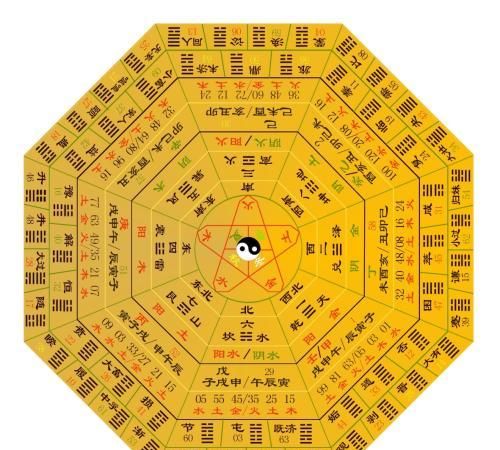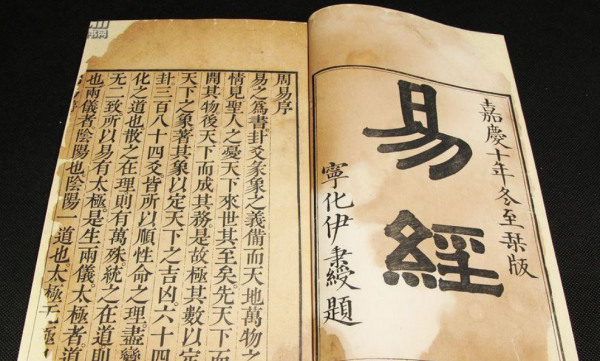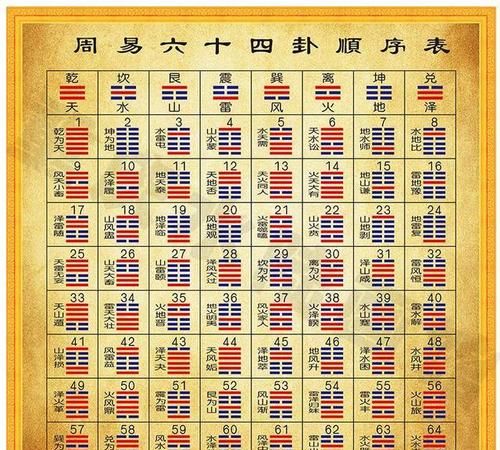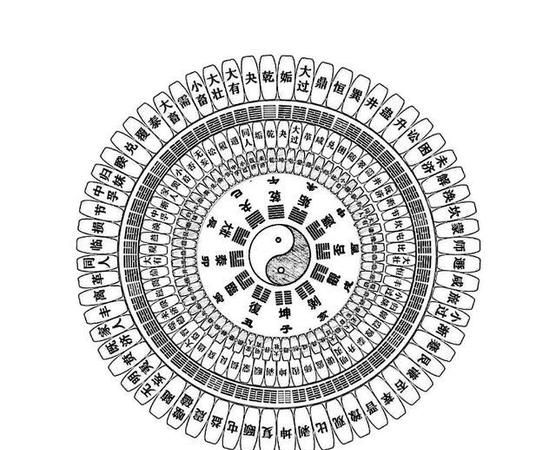Contents of this article
- 1. The full text of the sixty-four hexagrams of the Book of Changes
- 2. What are the sixty-four hexagrams in the Book of Changes for?
- 3. Detailed explanation of the auspicious hexagrams for each of the sixty-four hexagrams
- 4. Detailed explanation of the sixty-four hexagrams of Zhouyi
The full text of the sixty-four hexagrams of the Book of Changes
The eleventh hexagram: Tai, Tiandi Tai, Kun Shang Qian Xia|
Tai: small to big, good fortune.
Tuan said: Tai, small to large, good luck. This means that heaven and earth interact, and all things are connected; upper and lower interact, and they are of the same mind. The inner yang is the outer yin, the inner strength is the outer docility, the inner gentleman is the outer villain, the gentleman's Tao is long, and the villain's Tao is eliminated.
Xiang said: Heaven and earth are harmonious, and then wealth (treasure) is used to form the way of heaven and earth, assisting in the suitability of heaven and earth, and controlling the people.
The ninth day of the lunar month: Pull out the grass and ruts, and use their yín to gain good luck. Xiang said: Pull out the grass to signify good luck, and your ambition is external.
Ninety-two: Baohuang, use Fenghe, do not leave, friends die, and you have to stay in Zhongxing. Xiang said: Bao Huang, you have to be still in the middle line, so as to achieve greatness.
Ninety-three: There is no peace or failure, there is no return, there is no fault in hardship. Don't worry about your wealth, you will be blessed with food. Xiang said: There is no going back, and there is no return between heaven and earth.
Sixty-four: If you are graceful and not rich, you will be like your neighbors, and if you are not careful, you will be rich. Xiang said: Being elegant is not rich, both are false. If you don't take the precepts, you will be willing to do it.
Sixty-five: Emperor Yi returns to his sister to bring good luck to Yuan Yuan. Xiang said: To bring good luck to the Yuan, and to fulfill one's wishes.
Chapter 6: The city is restored to the emperor, do not use teachers. Since the city tells the truth, Zhen stingy. Xiang said: If the city is restored to the emperor, its destiny will be in chaos.
The twelfth hexagram, No, Earth and Heaven, Qian above and Kun below
No: No's bandits are not good for a gentleman's chastity.
Tuan said: If you do not do so, it is not good for a gentleman to be honest. If there is no communication between the great and the small, then the heaven and the earth will not communicate with each other, and all things will be blocked; if there will be no communication between the superior and the inferior, there will be no country in the world. Yin on the inside and yang on the outside, soft on the inside but strong on the outside, a villain on the inside but a gentleman on the outside. The villain's Tao is long, and the gentleman's Tao disappears.
Xiang said: Heaven and earth are not in harmony, no; a gentleman uses frugality to overcome difficulties, but cannot use glory and wealth.
On the sixth day of the lunar month: Pull out the maoru and use it to make it prosperous. Xiang said: Pulling out the grass is auspicious, and the ambition is for you.
Sixty-two: Undertake. The villain is lucky, the grown-up is prosperous. Xiang said: If you are prosperous, you will not mess with the crowd.
Sixty-three: Bao Shame. Xiang said: "It's shameful and it's not in the right position."
Ninety-four: There is no blame for fate, and it is good to be away from home. Xiang said: If there is a destiny, there is no blame, it is the will.
Ninety-five: No, good luck to you. Its death and its death are tied to the buds and mulberry trees. Xiang said: It is a good thing for you that you are in the right position.
Shangjiu: Do you like it or not? First no, then happy. Xiang said: Otherwise, it will end up falling, and how can it last long?
Hexagram 13, Tongren, Tianhuo Tongren, Qian Shanglixia
Tongren: Tongren in the wild, prosperous. It is beneficial to cross the great river, and it is beneficial to the gentleman.
Tuan said: Tongren, the soft position is in the middle, and it should be dry, it is called Tongren. As the saying goes, if you go to the wild with others, you will prosper. It is beneficial to cross the great rivers, and it is also a good way to travel. Civilization should be healthy and upright, and a gentleman should be upright. Only a gentleman has the ambition to conquer the world.
Xiang said: Heaven and fire are the same people; a gentleman distinguishes things by their kind.
Ninth day of the lunar month: There is no blame for being in the same household. Xiang said: "If you go out with others, who is to blame?"
Sixty-two: Fellow people in the clan, stingy. Xiang said: If you share the same clan with others, you will be stingy with the Tao.
Ninety-three: Fu Rong in the Mang, raised to the high mausoleum, three years old and unhappy. Xiang said: Subduing the enemy is a strong enemy. If you are unhappy at the age of three, you will be safe.
Ninety-four: Take advantage of the attack and attack, which is auspicious. Xiang said: If you take advantage of its Yong, it will be righteous and unstoppable; if it is auspicious, it will make you sleepy and vice versa.
95: Fellow people, first howl and then laugh. Master Ke meets. Xiang said: The first thing to do with others is to be straight. When masters meet, their words are in conflict with each other.
Chapter 9: Living with others in the suburbs, no regrets. Xiang said: We are together in the suburbs, but our ambitions have not been achieved.
The fourteenth hexagram, Dayou, Huotian Dayou, Lishangganxia
Dayou: Yuanheng. Tuan said: "Da You", "Rou" has the honorable position, "Dazhong" responds to it from top to bottom, "Da You" is called "Da You". Their virtues are strong and civilized, and they are in accordance with the heavens and follow the times, which is why they are prosperous.
Xiang said: Fire is in the sky, and there is a lot of it. A gentleman uses it to eliminate evil and promote good, and he surrenders his life in obedience to heaven.
Ninth day of the lunar month: There is no harm, banditry is to blame, and there is no blame for hardship. Xiang said: There is no harm in the ninth day of the lunar month.
Ninety-two: A large cart can carry it, and you will go there without any blame. Xiang said: A large cart can carry it, and it will not be defeated even if it accumulates.
Ninety-three: The public is prosperous with the emperor, and the villain is Fuke. Xiang said: If the common good is prosperous to the emperor, it will be harmed by villains. Ninety-Four: There is no blame to be found in banditry. Xiang said: There is no fault in robbing the peng; it is clear and clear.
Sixty-five: Jue Fu Jiao Ru, Wei Ru; Ji. Xiang said: Jue Fu and Jie Ru, trust is the way to aspire. Prestige is as good as luck, but it is easy but unprepared.
Chapter 9: Since God has blessed you, everything will be good and bad. Xiang said: There is great good luck, it is from God's blessing.
Hexagram 15, Qian, Dishan Qian, Kun Shang Gen Xia
Qian: Heng, a gentleman has an end.
Tuan said: Qian, Heng, the way of heaven is beneficial and bright, while the way of earth is humble and ascending. The way of heaven is full of loss but beneficial to humility, the way of earth becomes full and full of flow, the way of ghosts and gods is full of harm but full of blessings, the way of human beings is full of evil but good for humility. Humble and honorable, humble and insurmountable, this is the end of a gentleman.
Xiang said: There are mountains in the earth, so be humble; a gentleman will benefit the few by collecting more, and he will give things in equal measure.
Sixth day of the lunar month: A humble gentleman, crossing the great river, auspicious. Xiang said: A humble gentleman is humble enough to feed himself.
Sixty-two: Ming Qian, Zhenji. Xiang said: Ming Qian Zhenji, the center is obtained.
Ninety-three: A gentleman who works hard will have good luck in the end. Xiang said: A humble gentleman will be obeyed by all the people.
Sixty-four: No disadvantage, (扌为) modest. Xiang said: There is no disadvantage, (it is) modest; it is not against the law.
Sixty-Five: If you are not rich, you will be able to treat your neighbors and take advantage of them to invade and cut down, and there will be no disadvantage. Xiang said: Taking advantage of invasion and conquering, you will not surrender.
Chapter 6: Ming Qian, using his masters to conquer the country. Xiang said: "Mingqian, the ambition is not achieved." You can use it as an expert to conquer the country.
Hexagram 16 Yu Lei Di Yu, Zhen Shang Kun Xia
Yu: Li Jianhou Xingshi.
Tuan said: Yu, just respond and act with determination, obey and move, Yu. Yu, follow the movement, so the heaven and the earth are like this. How about Jianhou Xingshi? The heaven and the earth move in an orderly manner, so the sun and the moon do not pass through, and the four seasons are not affected. If a sage moves in an orderly manner, the punishments are clear and the people obey. The time of Yu was filled with great righteousness!
Xiang said: Thunder comes out of the ground and it is fierce, Yu. The former kings worshiped virtue through music, and Yin recommended the gods to match the ancestors' examinations.
Sixth day of the lunar month: Ming Yu, fierce. Xiang said: On the sixth day of the lunar month, the name "Yu" sounds, and the ambition is terrible.
Sixty-Two: Between stones, never ending, chastity and auspiciousness. Xiang said: Not all day long, chastity and good luck; it is the right way.
Sixty-three: Xuyu, regret. Too late to regret. Xiang said: Xuyu has regrets and is not in the right position.
Ninety-Four: From Yu, there will be great gains. Don't doubt it. Peng hairpin. Xiang said: From Yu, there will be great gains and great ambitions.
Sixty-five: Zhenji will never die. Xiang said: "Sixty-five Zhenji is a way to take advantage of strength." Eternal immortality, the middle is not dead.
Sixth chapter: Ming Yu, success is due to Chongqing, no blame. Xiang said: Mingyu is above, how can it be long?

What are the sixty-four hexagrams in "The Book of Changes"?
1. The sixty-four hexagrams of the Book of Changes are recorded in the "Book of Changes". The image of each hexagram is composed of two hexagrams up and down. Each hexagram has six lines. It reflects sixty-four different affairs, situations, phenomena, philosophies of life under specific circumstances, and the operating laws of nature through the combination of sixty-four hexagrams.
2. The sixty-four hexagrams of the Book of Changes are a combination of sixty-four hexagrams to reflect sixty-four different affairs, situations, phenomena, philosophies of life in specific environments, and the operating laws of nature. Each hexagram has six lines and lines, as well as 384 corresponding states. Through these changes, we can understand the operation of all things in the world and the philosophy of life.

3. The hexagram sequence of 64 hexagrams in the "Book of Changes" is based on the 8 hexagrams. The main understandings of the predecessors include "the theory of innate Bagua" and "the theory of acquired Bagua". Each has its own characteristics, but they are different from the 64 hexagrams. The contact seems to be attached.
4. Someone put forward the concept of "two or two coincidences, either reverse or overturn" for Hexagram 64, which can be said to be a big progress. It pointed out some internal connections of Hexagram 64.
5. However, this concept also has flaws, which lies in its formulation of "seeing only the trees but not the forest" and failing to systematically solve the problem of hexagram order in the "Book of Changes".
Detailed explanation of the auspicious hexagrams for each of the sixty-four hexagrams
1. The sixty-four hexagrams of the Book of Changes were created by Xibo Hou Jichang (King Wen of Zhou) during the seven years he was imprisoned by King Zhou. He studied Fuxi Bagua in prison and deduced it based on the Bagua. Therefore, it is also called the Sixty-Four Hexagrams of Zhouyi.
2. Sixty-four hexagrams: The sixty-four hexagrams in the Book of Changes are composed of two hexagrams, one above and one below. The meaning of each hexagram can be found in: List of Thirty Hexagrams in the Book of Changes and List of Thirty-four Hexagrams in the Book of Changes.
3. The eight hexagrams in the Book of Changes are repeated in pairs and arranged into sixty-four hexagrams. The hexagram names are: Qian, Kun, Tun, Meng, Need, Litigation, Teacher, Bi, Small Animal, Lu, Tai, Bu, Tongren, Dayou, Qian, Yu, Sui, Gu, Lin, Guan, Eat and Bi. ﹑Peel, ﹑Recover, ﹑Wuwang, ﹑Big animal, ﹑Yip, ﹑Daguo,﹑Kan,﹑Li,﹑Xian,﹑Heng,﹑Escape,﹑Da Zhuang,﹑Jin,﹑Ming Yi,﹑Family,﹑睽,﹑鹑﹑Jie,﹑Loss,﹑Benefit,﹑夬,﹑姤﹑ Cui, Sheng, Yu, Jing, Le, Ding, Zhen, Gen, Jian, Guimei, Feng, Lv, Xun, Dui, Huan, Jie, Zhongfu, Xiaoguo, Jiji, not Jiji.

Detailed explanation of the sixty-four hexagrams of Zhouyi
Hexagram 17, Ze Lei Sui (sui hexagram), adaptable at any time
Zhongzhong hexagram
Xiang said: I have been walking in the mud for several years, and my cart has been leaning against the cliff. Right now, it’s time to try harder and climb up the cliff to make a fortune.
This hexagram is a superposition of different hexagrams (shock at the bottom and dui at the top). Shock is thunder and movement; dui is joy. Moving and enjoying means "following". Sui means mutual obedience, what you have can follow you, things can follow you, and communicate with each other. Always follow the trend, have principles and conditions, and take perseverance as the premise.
Hexagram 18, mountain wind Gu (Gu hexagram), ups and downs, fatigue and decline
Zhongzhong hexagram
Xiang Said: The lines in the hexagram are like grinding mills. Going smoothly can be a blessing but a disaster. It is beneficial but slow in the mind. In everything, do things in a hurry and make mistakes.
This hexagram is a different hexagram (lower Sunda and upper Gen) that overlaps each other, and is a comprehensive hexagram with the Sui hexagram. Gu (gu) originally means things, but it is extended to mean troubles and chaos. When utensils are not used for a long time, insects will grow on them, which is called "gu". It means that the world has been in a stable state for a long time, and it is corrupt and needs innovation and creation, management and rectification, to save the crisis and revive the cause.
Hexagram 19, Dize Lin (Lin hexagram), teaches the people to protect the people
Middle and upper hexagram
Xiang Said: The king is unruly and the people are hanging upside down. They often want to clear the clouds and see the blue sky. Fortunately, the Ming Lord shows benevolent government and they can live in peace and contentment again.
This hexagram is a superposition of different hexagrams (lower versus upper Kun). Kun is the earth; Dui is the Ze, the earth is higher than the Ze, and the Ze is in the earth. It means that the monarch personally visits the world to govern the country and ensure peace and harmony between the top and bottom.
Hexagram 20, Guan Guan (Guan Gua), look down and up
Middle and upper hexagram
Xiang Said: If the hexagram encounters blooming flowers, drought, and rivers, there will be a lot of interest in business, there will be help for your marriage, and you will never be tortured when you go out.
This hexagram is an overlapping hexagram of different hexagrams (Xia Kun and Xun above). It is popular on the ground and means that moral teachings are spread everywhere. Guan Gua and Lin Gua are complementary hexagrams and are used interchangeably. Those above view the world with moral principles; those below view the world with admiration and obedience.
The 21st hexagram, the fire and thunder bites (the bite hexagram), the combination of hardness and softness
Shangshang hexagram
Xiang said : Poor luck is like being hungry. Fortunately, food is delivered again and again. The food is good enough to fill the stomach and heart with joy, and the sorrow gradually disappears.
This hexagram is a superposition of different hexagrams (lower shock and upper separation). Li is the Yin hexagram; Zhen is the Yang hexagram. The intersection of yin and yang means chewing hard objects, which means the combination of kindness and power, the combination of leniency and severity, the combination of hardness and softness. Shihe refers to the upper and lower jaws biting and chewing.
The 22nd hexagram, Mountain Fire Ben (Bian hexagram), decorated with external qualities
Middle and upper hexagram
Xiang said : Recently, there has been a strong and energetic week, and gentle ladies and gentlemen are praying for it. The music of bells and drums brings great auspiciousness, and the occupier will be happy to meet you.
This hexagram is a superposition of different hexagrams (lower Li and upper Gen). Li is fire and Ming; Gen is mountain. Be civilized and measured. Bi (bi) hexagram discusses the relationship between text and quality, focusing on quality and regulating it with text. Ben, decoration, modification.
The 23rd hexagram, mountain peeling (peeling hexagram), stop with the trend
Middle and lower hexagram
Xiang said: The magpie met the sky and stayed in the forest at night. He didn't know that there was an eagle in the forest first.
This hexagram is a superposition of different hexagrams (lower Kun and upper Gen). Five yins are below and one yang is above. The yin is strong and the yang is lonely; the mountains are attached to the earth. Both are peeling signs, so they are called "peeling hexagrams". This hexagram has a strong yin and a weak yang, which means that a villain will gain power, a gentleman will be in trouble, and his career will be ruined.
The 24th hexagram, Di Lei Fu (Fu hexagram), contains the movement of Shun
Zhongzhong hexagram
Xiang said : Ma's father-in-law is not in harmony with each other, and the world has many worries and doubts. The benefactor is unrighteous and resentful, and right and wrong cause trouble.
This hexagram is a superposition of different hexagrams (lower shock and upper kun). Zhen means thunder and movement; Kun means earth and means smoothness, and movement means smoothness and letting nature take its course. Movement is in the middle, with internal yang and external yin, moving in an orderly manner, advancing and retreating freely, which is conducive to progress.

The above is the detailed explanation of the 64 hexagrams, the complete version of the sixty-four hexagrams of the Book of Changes, and the related content of the detailed explanation of the 64 hexagrams. I hope it can help you.
